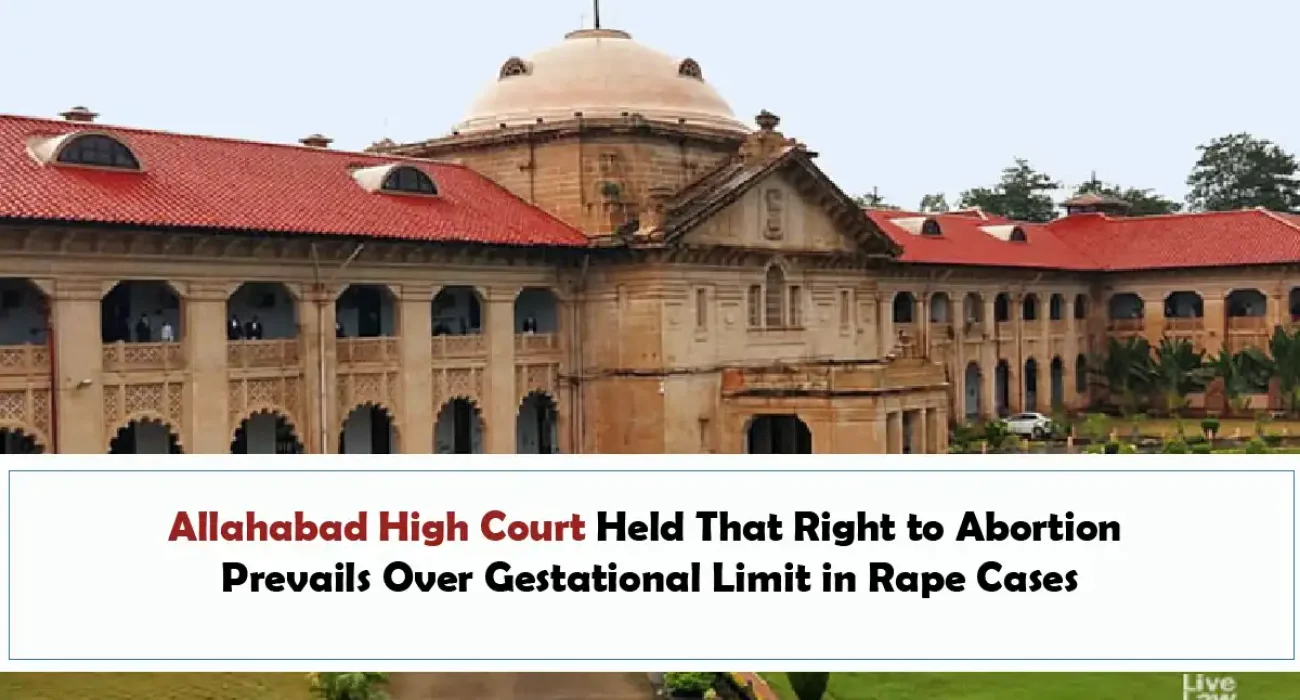

Table of Contents
ToggleThis writ petition was filed before the Allahabad High Court on behalf of a 17.5-year-old minor girl, a rape survivor, seeking permission for the medical termination of her pregnancy. The petitioner is the victim in Case Crime No. 80 of 2025, registered under Sections 65(1) and 351(2) of the Bharatiya Nagarik Suraksha Sanhita (BNSS), 2023, and Sections 5j(ii) and 6 of the Protection of Children from Sexual Offences (POCSO) Act, 2012. Her pregnancy, discovered as a result of the sexual assault, had advanced to 26 weeks and 5 days at the time of the first medical board examination conducted on 13 June 2025, and to 29 weeks and 1 day by the second examination on 2 July 2025. By the date of hearing, the pregnancy was approximately 31 weeks. The minor, represented through her father, had initially approached the Chief Judicial Magistrate (CJM), Agra, who referred the matter to the Chief Medical Officer. Although the Medical Board expressed reservations about terminating the pregnancy at this stage due to medical risks, the petitioner remained firm in her decision to not carry the pregnancy to term.
The petitioner contended that being compelled to continue the pregnancy would violate her right to life, privacy, and dignity under Article 21 of the Constitution. The pregnancy was the result of a rape that had left her physically and mentally devastated. The petitioner and her parents clearly expressed their inability to go through with the pregnancy due to social stigma, psychological trauma, and their difficult economic condition. Even when the Court arranged counselling sessions with a psychiatrist and a clinical psychologist from S.N. Medical College, Agra, the petitioner and her family remained resolute in their choice to terminate the pregnancy. The counselling report confirmed that they understood the risks and alternatives but were still unwilling to proceed with the delivery. It was further submitted that reproductive autonomy includes the right to make decisions about one’s own body, and this right must be respected even if the gestational age exceeded statutory limits.
The State, represented by the Additional Chief Standing Counsel, relied on the Medical Board’s assessment that terminating the pregnancy at 31 weeks might be medically unsafe and could endanger the lives of both the minor and the foetus. Nevertheless, the State did not oppose the urgency of the matter and placed the final decision at the Court’s discretion. The State also confirmed that the minor’s physical and mental health were fragile and that the impact of the crime had resulted in extreme psychological distress. The Principal of S.N. Medical College and the counselling team expressed concern about the petitioner’s deteriorating mental condition and acknowledged that the trauma and social stigma surrounding the pregnancy were key reasons for her refusal to deliver the child.
The Allahabad High Court considered the petitioner’s plea in light of the constitutional and statutory framework governing reproductive rights. The Court referred to the Supreme Court’s judgment in A (Mother of X) v. State of Maharashtra, (2024) 6 SCC 327, where it was held that the right to abortion stems from the right to dignity, bodily autonomy, and mental and physical health under Article 21. The Supreme Court had noted that the Medical Termination of Pregnancy Act, 1971, allows termination beyond 24 weeks in cases where it is necessary to save the life of the pregnant person. The Allahabad High Court stressed that the current law unfairly limits such exceptions only to cases of foetal abnormalities, excluding equally severe situations like pregnancies resulting from rape.
The Court also highlighted that the medical board’s role is not merely to confirm foetal viability but also to provide an opinion on the physical and mental health impact on the pregnant person. It noted that the petitioner, after full and informed counselling, had exercised her agency and refused to continue the pregnancy. Citing the decision in XYZ v. State of Gujarat, 2023 SCC OnLine SC 1573, the Court reaffirmed that a woman’s consent and decision regarding her pregnancy are paramount and must be respected even if the statutory gestational limits have been crossed. The Court acknowledged that rigid interpretation of the MTP Act in such cases could result in the denial of justice and deepen the trauma experienced by survivors of sexual violence.
Balancing the petitioner’s reproductive rights with the medical risks cited, the Allahabad High Court allowed the termination of the pregnancy with a “heavy heart,” given the extraordinary circumstances. It issued the following directions:
The petitioner, along with her parents, was directed to appear before the Principal, S.N. Medical College, Agra, on the next day during the first session. The principal was instructed to immediately constitute a team of specialists to perform the medical termination of pregnancy, preferably on the same day or no later than the following day.
The District Magistrate, Agra, was directed to ensure that all medical and related expenses, including travel and accommodation for the petitioner and her family, were covered by the State. The aborted foetus was to be preserved in accordance with legal procedure for forensic examination in the ongoing criminal case. All parties were instructed to maintain strict confidentiality of the petitioner’s identity and the entire process.
Written by Adv. Deeksha Rai
IAW resources
Browse our help directory